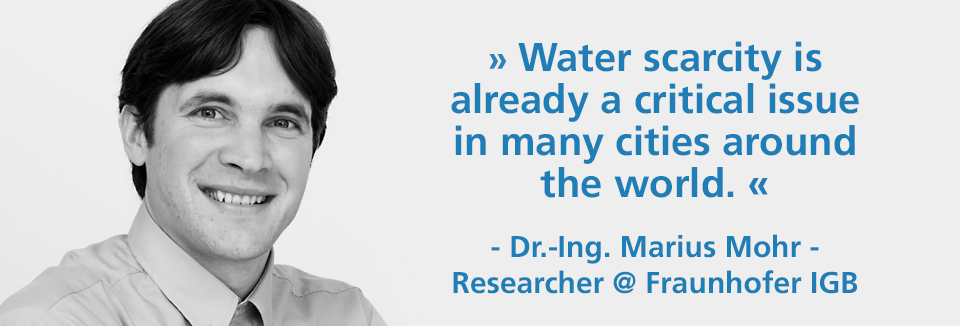
5 Questions on intelligent water management

"The water is a friendly element to whomever is familiar with it and knows how to treat it", said Johann Wolfgang von Goethe. Since no raw material for us humans is of such prominent significance as the water, the United Nations (UN) has launched the World Day of Water already 25 years ago to point out the importance but also the scarcity of the survival-important resource. Morgenstadt researchers at the Fraunhofer Institute are also working to reduce the global consumption of water and to establish sustainable water management practices. We spoke with the Group Leader for Integrated Water Management at Fraunhofer IGB, Dr.-ing. Marius Mohr, with regards to the World Day of Water and learned more about his research area.
1. Why is sustainable water management particularly important for cities?
M.M.: In cities, many people live on a relatively small area. Therefore, a lot of water is consumed, and a lot of wastewater is generated. Since the physical space in cities are valuable, the necessary infrastructure has to be accommodated on a small area. In addition, most of the surfaces in the city are sealed so that the rain drains and does not seep away. Especially in heavy rainfall periods, floods can occur. The topic is gaining acute importance bearing in mind that many people are still moving to the urban areas, especially in poorer countries, and advancement and progress of infrastructure cannot follow the fast phase of population growth in cities. Currently water scarcity is already a critical issue in many cities around the world.
2. Through which intelligent approaches can drinking water consumption be avoided?
M.M.: The water resources are distributed very differently across the regions, that is why there are also major differences in the understanding of the importance of water-saving. Nevertheless, the consumption of water is always accompanied by the consumption of energy. Therefore, even in regions with sufficient water resources, it makes sense to deal sparingly with it. First of all, it is important that users have an understanding that they should use the water sparingly. Frugal fittings in the bathroom can support this. In many cities, however, a large part of the water leaks in the ground before it reaches the users. Leaking water pipes are liable of that. Here, intelligent management of pressure in the water network can help keep the losses low. Additionally, sensors can help to detect leaks in the network. Moreover, high quality drinking water does not have to be utilized for every type of use. For the purpose of flushing toilet and/or irrigating the garden, relatively lower quality water can also be used, e.g. rain water or purified wastewater. This also helps to reduce the consumption of drinking water.
3. What can the Fraunhofer Society do to support cities on their way to sustainable water management?
M.M.: Scientists from the Fraunhofer Society have been researching practical solutions for sustainable water management for many years already. Especially exemplary implementations of innovative ideas can help to make new concepts more familiar and gain experience. Due to the wide range of competences, the Fraunhofer-Gesellschaft is able to develop cross-sectoral solutions, as it already occurs through the Morgenstadt network. A long-term cooperation with the city administrations and companies which offer such innovative solutions for cities is necessary here, as it takes a long time for a complex system like a city to change.
4. What are you currently working on personally?
M.M.: Since last year, within the framework of the collaborative project HypoWave sponsored by the German Federal Ministry of Education and Research (BMBF), I have been investigating the possibility of using purified waste water for the irrigation and fertilization of vegetables, which is planted in a hydroponic greenhouse. A pilot project on a small wastewater treatment plant near Wolfsburg will be put into operation these days. In addition, I am working on a sustainable approach to water infrastructure on a major industrial site - here the subject is how to deal with rainwater, but also the use of the heat from the waste water. In another project, we investigated the extent to which a high-load digestion for sewage sludge can be flexibly operated, in order to provide energy in the form of biogas if the wind and the sun produce little.
5. Are there pilot projects that illustrate how smart water management works?
M.M.: Yes, but still too few. I was responsible for the implementation of the DEUS 21 project in Knittlingen, where waste water from 100 properties is being collected via a vacuum system. The aim here was to demonstrate that a large-scale recycling is also possible for the waste water and its ingredients such as energy and nutrients. To a much larger extent, a similar solution will soon be implemented in Hamburg - Jenfelder Au. The first projects in which innovative water management concepts have been implemented are Lübeck-Flintenbreite and Block 6 in Berlin-Kreuzberg.